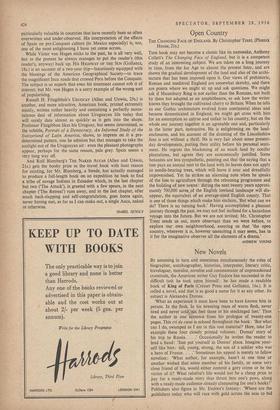Open Country
THIS book may not become a classic like its namesake, Anthony Collett's The Changing Face of England, but it is a competent study of an interesting subject. We are taken on a long journey in time, from the Ice Age to almost the present hour, and are shown the gradual development of the land and also of the archi- tecture that has been imposed upon it. Our views of prehistoric, Roman and medieval England are somewhat sketchy, and there are points where we might sit up and ask questions. We might ask if Maumbury Ring is not earlier than the Romans, not built by them but adapted as an amphitheatre, or ask how the writer knows they brought the cultivated cherry to Britain. When he tells us our Gothic architecture evolved from continental ideas and became domesticated in England, we might get cross with him for an assumption so untrue and unfair to his country, but on the whole our journey together is an agreeable one and, particularly in the latter part, instructive. He is enlightening on the land- enclosures, and his account of the draining of the Lincolnshire fens is not without a thrill. He is very fair about some present- day developments, putting their utility before his personal senti- ment. He regrets the blackening of so much land by conifer plantations, but agrees they are economically justified. Some botanists are less sympathetic, pointing out that the saying that a tree pays an annual rent to the land with its leaves does not apply to needle-bearing trees, which will leave it sour and dreadfully impoverished. Yet he strikes an alarming note when he speaks of the loss to agriculture through the rehousing programme and the building of new towns: during the next twenty years approxi- mately 700,000 acres of the English lowland landscape will dis- appear, the equivalent of an average-sized English county. That is one of those things which make him exclaim, 'But what can we do? There is no turning back.' Having accomplished a pleasant journey through the past, we may not feel inclined for a hazardous voyage into the future. But we are not invited; Mr. Christopher Trent sends us out, more observant than we were before, to explore our own neighbourhood, assuring us that 'the open country, wherever it is, however unexciting it may seem, has in it for the imaginative observer all the elements of a drama.'
ANDREW YOUNG


































 Previous page
Previous page